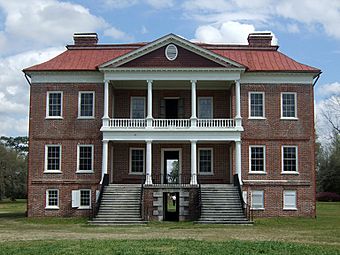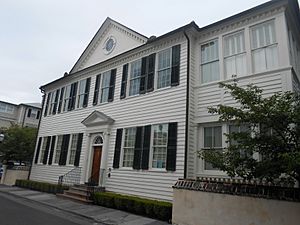Drayton Hall facts for kids
|
Drayton Hall
|
|
|
U.S. Historic district
Contributing property |
|

Drayton Hall (front)
|
|
| Nearest city | Charleston, South Carolina and North Charleston, South Carolina |
|---|---|
| Built | 1747–1752 |
| Architectural style | Palladian |
| NRHP reference No. | 66000701 |
Quick facts for kids Significant dates |
|
| Added to NRHP | October 15, 1966 |
| Designated NHL | October 9, 1960 |
Drayton Hall is a very old house from the 1700s. It sits on the Ashley River in South Carolina, not far from Charleston, South Carolina. This amazing house is a great example of a special building style called Palladian architecture. It's also the only plantation house on the Ashley River that survived two big wars: the American Revolutionary War and the American Civil War. Because of its history and unique style, Drayton Hall is a National Historic Landmark.
Contents
Welcome to Drayton Hall!
Drayton Hall is a beautiful old home. It faces away from the river, towards the land. The front of the house has a special entrance area with columns, called a portico. This design looks a lot like a famous villa in Italy.
What Makes Drayton Hall Special?
The way Drayton Hall is built is very interesting. Its design was inspired by a style from a famous architect named Andrea Palladio. You can see this style in the house's layout. It has a large entrance hall with a grand staircase. There are also fancy fireplaces inside the house.
A Look Back in Time: Drayton Hall's History
Drayton Hall was built for John Drayton Sr., who bought the land in 1738. He was the grandfather of another important person named John Drayton.
Building a Dream Home
For a long time, people thought the house was started in 1738 and finished in 1752. But in 2014, scientists looked at the wood in the attic. They found that the trees used for the attic were cut down in the winter of 1747–48. This means the house was likely ready for people to live in by the early 1750s.
Life on the Plantation
The house is part of a large property, about 630 acres. This land was used as a plantation, growing crops like indigo and rice. Many people lived and worked on the plantation. There were once 13 cabins on the property where about 78 enslaved people lived. Their hard work was essential to the plantation.
Surviving the Years
Seven generations of the Drayton family took care of the house. Over the years, some other buildings around the main house were lost. An earthquake in 1886 destroyed the laundry house. A hurricane in 1893 took down the kitchen. But the main house stood strong through it all. Drayton Hall is now part of the Ashley River Historic District. It was named a National Historic Landmark in 1960.
Images for kids
Learn More
 | Sharif Bey |
 | Hale Woodruff |
 | Richmond Barthé |
 | Purvis Young |









